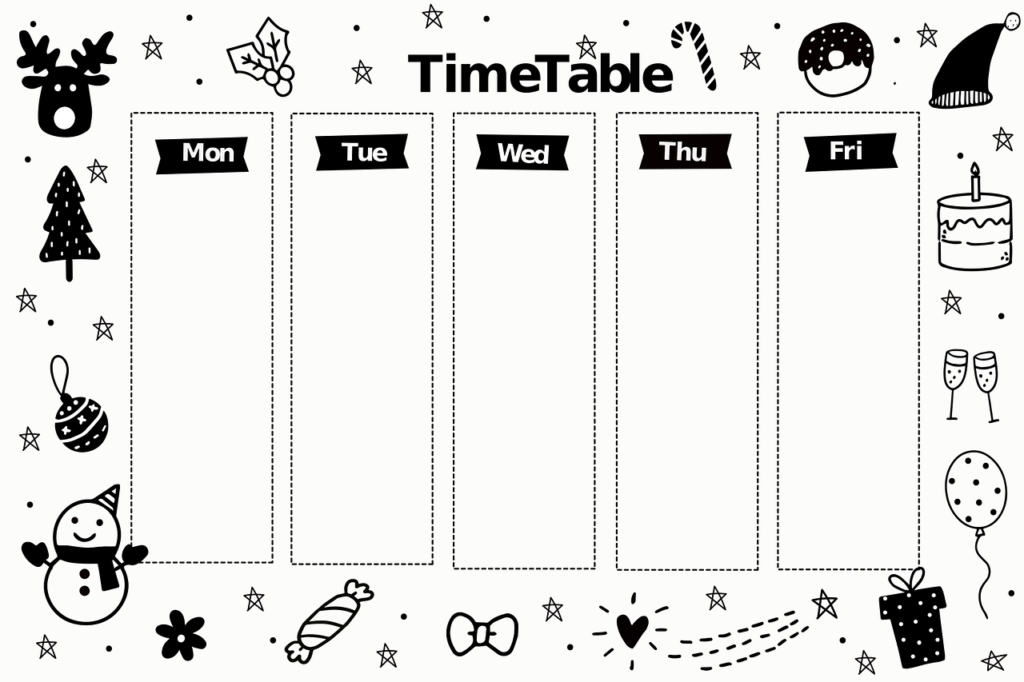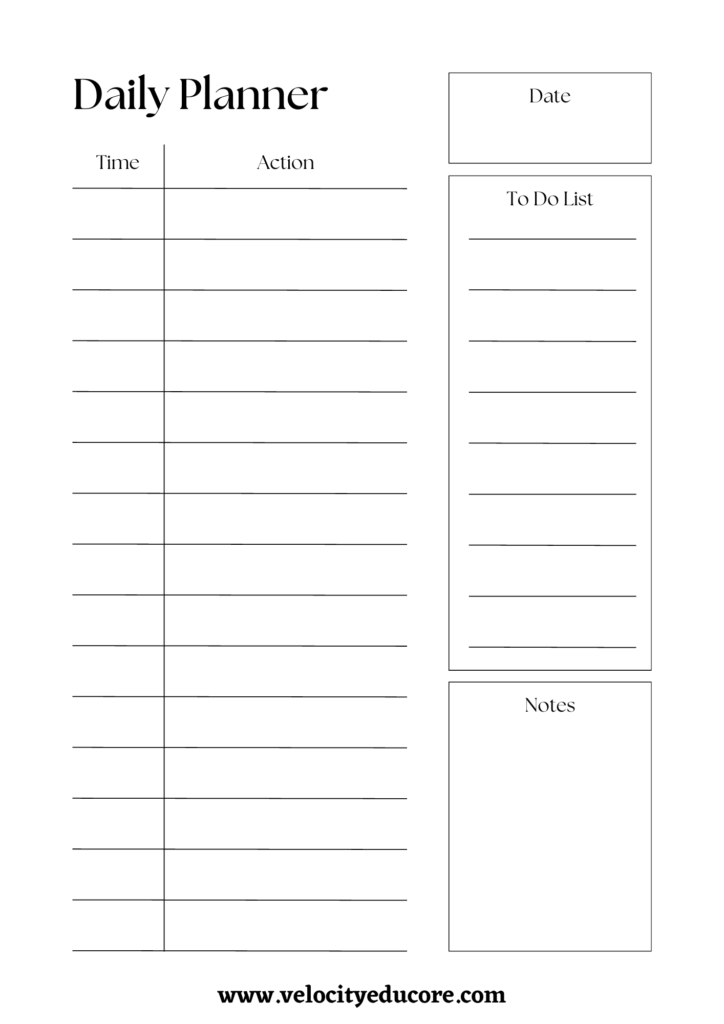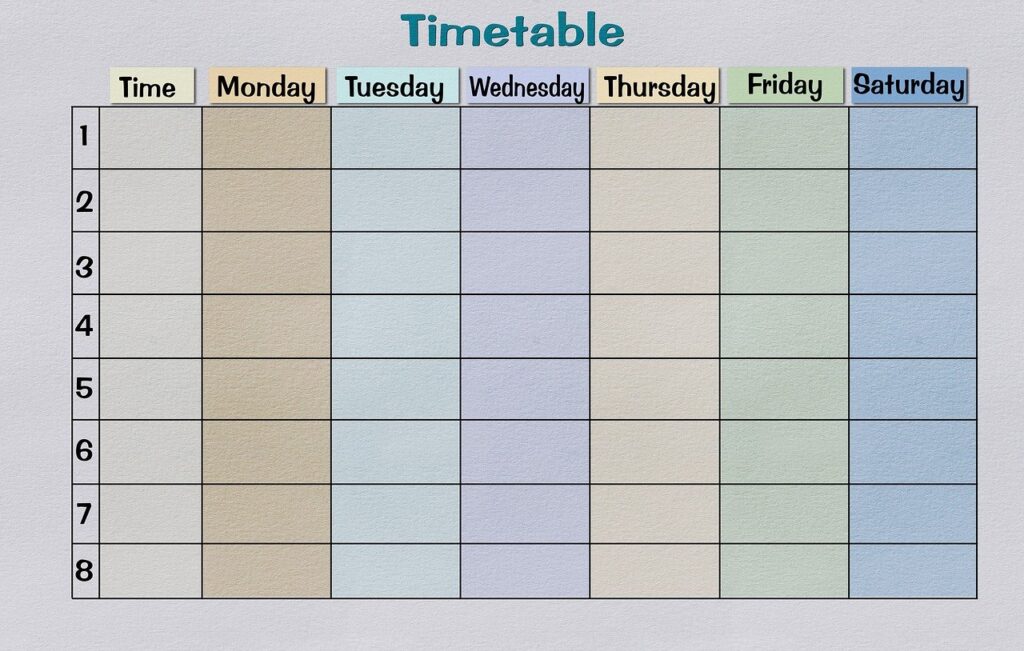Perfect Study Time Table
- Introduction
- How important it is to make a time table?
- How to make a Perfect time table?
- How can I improve my studies?
- How do I be consistent in studies?
- How many hours a day should you study?
- How do I make a effective time table and follow it?
- Make a check list
- Track yourself
- Some time table templates:
- How do the most successful people spend the first hour of their day?
Introduction

A study timetable is a schedule that outlines when and for how long you will spend studying each day. It can be a helpful tool for organizing your time and ensuring that you have enough time to cover all of your course material. By following a study timetable, you can also stay focused and avoid procrastination.
How important it is to make a time table?
A study timetable can be an important tool for organizing your time and staying on track with your studies. It can help you:
- Prioritize your tasks: By outlining your study schedule, you can see exactly what you need to do and when. This can help you prioritize your tasks and focus on the most important ones first.
- Stay organized: A study timetable can help you keep track of what you have already studied and what you still need to cover. This can help you stay organized and avoid feeling overwhelmed.
- Avoid procrastination: By setting aside specific times for studying, you can avoid the temptation to procrastinate and put things off until later.
- Stay focused: When you have a specific study schedule, it can be easier to stay focused and avoid distractions.
Overall, a study timetable can be a helpful tool for managing your time and staying on track with your studies. However, it’s important to be flexible and adjust your timetable as needed. If you find that your schedule isn’t working for you, don’t be afraid to make changes and find a schedule that works better.
How to make a Perfect time table?

To make a perfect study timetable, follow these steps:
- Determine your goals: Before you start making a study timetable, it’s important to know what you want to achieve. Do you have a specific exam or assignment that you need to prepare for? Are you trying to improve your grades in a particular subject? Knowing your goals will help you prioritize your time and focus on the most important tasks.
- Assess your current schedule: Take a look at your current schedule and determine how much time you have available for studying. Be sure to consider any commitments you have, such as work, extracurricular activities, or family responsibilities.
- Identify your most productive times: Everyone has different times of day when they are most productive. Some people are morning people and do their best work early in the day, while others are night owls and work best later in the evening. Identify the times of day when you feel most alert and focused, and try to schedule your study sessions during those times.
- Break your study sessions into manageable chunks: Instead of trying to study for long periods of time, it’s often more effective to break your study sessions into shorter, more manageable chunks. This will help you stay focused and avoid burnout.
- Be flexible: While it’s important to have a schedule, it’s also important to be flexible. Things come up, and you may need to shift your study schedule around. Don’t get too tied to a specific schedule, and be willing to adjust as needed.
- Take breaks: It’s important to take breaks and give your brain a chance to rest. Take a few minutes to stretch, grab a snack, or just relax for a bit. This will help you stay refreshed and focused when you return to your studies.
- Stay organized: Keep all of your notes, textbooks, and other study materials organized and in one place. This will help you stay on track and avoid wasting time searching for things.
By following these steps, you can create a study timetable that works for you and helps you achieve your goals.
How can I improve my studies?
Here are some tips that may help you improve your studies:
- Set specific goals: Knowing what you want to achieve can help you stay focused and motivated. Set specific, achievable goals for each study session and track your progress.
- Find a good study environment: Choose a quiet, well-lit place to study. Avoid distractions like noise and technology, and try to eliminate any other sources of distraction.
- Take effective notes: When you’re listening to lectures or reading textbook material, try to take notes that are concise and organized. This can help you retain information and refer back to it later.
- Practice active learning: Instead of just passively reading or listening to material, try to engage with it actively. Ask questions, participate in discussions, and try to apply the material to real-world situations.
- Take breaks: It’s important to take breaks and give your brain a chance to rest. Take a few minutes to stretch, grab a snack, or just relax for a bit. This will help you stay refreshed and focused when you return to your studies.
- Seek help when needed: If you’re having trouble with a particular subject or concept, don’t be afraid to ask for help. You can ask a teacher, tutor, or classmate for clarification or additional explanation.
By following these tips, you can improve your studies and make the most of your study time.
How do I be consistent in studies?

Here are some tips that may help you be more consistent in your studies:
- Set specific goals: Knowing what you want to achieve can help you stay focused and motivated. Set specific, achievable goals for each study session and track your progress.
- Follow a regular study schedule: Establish a regular study schedule and try to stick to it as closely as possible. By setting aside specific times for studying, you can make it a habit and avoid the temptation to procrastinate.
- Find a good study environment: Choose a quiet, well-lit place to study. Avoid distractions like noise and technology, and try to eliminate any other sources of distraction.
- Take breaks: It’s important to take breaks and give your brain a chance to rest. Take a few minutes to stretch, grab a snack, or just relax for a bit. This will help you stay refreshed and focused when you return to your studies.
- Seek help when needed: If you’re having trouble with a particular subject or concept, don’t be afraid to ask for help. You can ask a teacher, tutor, or classmate for clarification or additional explanation.
- Stay organized: Keep all of your notes, textbooks, and other study materials organized and in one place. This will help you stay on track and avoid wasting time searching for things.
By following these tips, you can be more consistent in your studies and make the most of your study time.
How many hours a day should you study?
There is no one-size-fits-all answer to this question, as the amount of time you should study depends on a variety of factors, including your age, the subjects you are studying, and your goals. Here are some general guidelines:
- High school students: Most high school students should aim to spend around 2-3 hours per day on homework and studying, in addition to the time they spend in class.
- College students: College students typically have more coursework and may need to spend more time studying. As a general rule, college students should aim to spend at least 2-3 hours per week per credit hour of coursework. For example, if you are taking 15 credit hours, you should aim to spend at least 30-45 hours per week studying.
- Graduate students: Graduate students generally have even more coursework and may need to spend more time studying. It’s a good idea to discuss your study schedule with your professors and advisors to get a sense of how much time you should be dedicating to your studies.
Keep in mind that these are just general guidelines, and the amount of time you should study may vary depending on your individual circumstances. It’s important to find a balance between your studies and other commitments, such as work, family, and leisure activities.
How do I make a effective time table and follow it?

To follow your study timetable, try the following tips:
- Set reminders: Use a planner or calendar to mark your study times, and set reminders to help you stay on track. This can be especially helpful if you have a busy schedule or are prone to forgetting.
- Create a study space: Choose a quiet, well-lit place to study and make it your dedicated study space. Keep all of your study materials in this space, and try to avoid doing other activities there, such as watching TV or browsing the internet.
- Eliminate distractions: Turn off your phone or put it in another room, and try to eliminate other sources of distraction, such as noise or clutter.
- Take breaks: It’s important to take breaks and give your brain a chance to rest. Take a few minutes to stretch, grab a snack, or just relax for a bit. This will help you stay refreshed and focused when you return to your studies.
- Stay motivated: Find ways to stay motivated and keep yourself on track. This could be setting rewards for yourself when you meet your goals, finding a study partner, or simply reminding yourself of the reasons you are studying.
By following these tips, you can stay on track and follow your study timetable consistently. Remember to be flexible and make adjustments as needed, and don’t be too hard on yourself if you have a hard time sticking to your schedule. It takes time and practice to develop good study habits, so be patient and keep working at it.
Make a check list
A check list is a list of tasks or items that you need to complete or check off. It can be a helpful tool for staying organized and on track with your studies. So always make a checklist and track yourself.
Track yourself
Here are some tips for tracking your progress while studying:
- Set specific goals: Knowing what you want to achieve can help you stay focused and motivated. Set specific, achievable goals for each study session and track your progress.
- Use a planner or calendar: Use a planner or calendar to mark your study times and track your progress. You can also use it to record your accomplishments and any challenges you encounter.
- Keep track of your notes: Keep all of your notes organized and in one place, and review them regularly. This will help you track your progress and identify any areas where you need to spend more time studying.
- Take practice tests or quizzes: Practice tests and quizzes can help you gauge your progress and identify areas where you need to improve.
- Seek feedback: Ask your teacher, tutor, or study partner for feedback on your progress. This can help you identify areas where you are doing well and areas where you need to focus more.
By following these tips, you can track your progress and stay on track with your studies.
Some time table templates:

How do the most successful people spend the first hour of their day?
The way that successful people spend the first hour of their day can vary widely, as everyone has their own routines and habits that work best for them. Some people may start their day by exercising or meditating, while others may spend the first hour reviewing their to-do list or tackling their most important tasks. Here are a few common habits that successful people might incorporate into the first hour of their day:
- Exercise or meditate: Many successful people start their day with physical activity or meditation to help them feel energized and focused.
- Review their to-do list: Successful people often start their day by reviewing their to-do list and prioritizing their tasks for the day. This can help them stay organized and focused.
- Tackle their most important tasks: Successful people often try to tackle their most important tasks first thing in the morning, when they are fresh and their minds are clear.
- Reflect on their goals: Some successful people take a few minutes to reflect on their goals and think about what they want to achieve in the day ahead.
- Plan their day: Successful people often spend a few minutes planning their day, including scheduling appointments and setting aside time for specific tasks.
Overall, the most successful people tend to start their day with a clear plan and a focus on their goals, and they try to make the most of the first hour by tackling their most important tasks and getting organized for the day ahead.
FAQ’s

Here are some frequently asked questions about making a study timetable and tracking progress:
- How often should I review my study timetable?
It’s a good idea to review your study timetable regularly, such as at the beginning of each week or month. This will allow you to make any necessary adjustments based on your progress and any changes in your schedule.
- What should I do if I have a hard time sticking to my study timetable?
If you have a hard time sticking to your study timetable, try breaking your study sessions into smaller, more manageable chunks, and take breaks to give your brain a chance to rest. It may also be helpful to find a study partner or accountability buddy to help keep you on track. Remember to be flexible and make adjustments as needed, and don’t be too hard on yourself if you have a hard time sticking to your schedule. It takes time and practice to develop good study habits.
- How can I stay motivated while studying?
To stay motivated while studying, try setting specific, achievable goals for each study session, and reward yourself when you meet those goals. Find ways to make studying more enjoyable, such as by listening to music or finding a study partner. Seek feedback from your teacher or tutor to get a sense of your progress and areas where you need to improve. Remember to take breaks and give yourself time to relax and recharge.
- How can I stay focused while studying?
To stay focused while studying, try to eliminate distractions, such as noise or technology, and find a quiet, well-lit place to study. Take effective notes and engage with the material actively by asking questions and applying it to real-world situations. Set specific goals for each study session and track your progress to stay motivated. Take breaks to give your brain a chance to rest, and avoid studying for long periods of time without a break.
Conclusion
In conclusion, making a study timetable and tracking your progress can be helpful in staying organized and on track with your studies. It’s important to determine your goals, assess your current schedule, and identify your most productive times. Break your study sessions into manageable chunks, be flexible, and take breaks to avoid burnout. Stay motivated and seek feedback on your progress. Using a planner or calendar and creating a check list can also be helpful in staying organized and on track. Remember to be patient and persistent, as developing good study habits takes time and practice.
Tags: Study time table, Study time table, Study time table, Study time table, Study time table, Study time table, Study time table, Study time table, perfect Study time table, how to make time table, Study time table templates, how to make study routine, Study time table, Study time table, Study time table,Study time table, Study time table, Study time table, Study time table, Study time table, Study time table, Study time table, Study time table, Study time table, Study time table, Study time table, Study time table,
